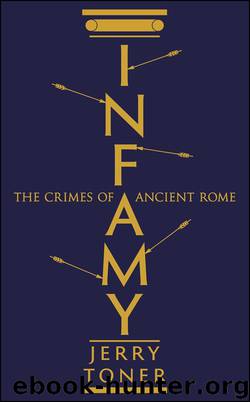Infamy by Jerry Toner

Author:Jerry Toner
Language: eng
Format: epub
Publisher: Profile
Published: 2019-03-10T16:00:00+00:00
Religion against Crime
Many of the questions contained in the Oracles of Astrampsychus relate to the difficulties of dealing with the law. ‘Am I safe from prosecution?’, ‘Will I obtain the petition?’, ‘Will I defeat my opponent in the trial?’ All these questions highlight the anxieties generated by involvement with the Roman legal system and the fact that people felt the need to turn to the gods for reassurance and advice. Another question, ‘Will I be safe if informed against?’ also gives a good idea of how the law was perceived to operate: among the responses are the statements, ‘through your friends’ and ‘after appeal’. It was never enough to have the evidence on your side. The successful claimant needed perseverance and a network of social contacts to help him pursue his case through the courts.
The problems involved in taking a legal route to gaining redress meant that many crime victims followed alternative religious avenues to try to gain satisfaction and revenge. Magic in particular seems to have offered a readily available means of solving and avenging crime. In one fourth-century curse, the victim of theft cries, ‘may the thief’s eye be struck as hard as I strike the eye with this hammer and may it become inflamed’ (Greek Magical Papyri 5.70–95). Clearly, hitting an image of an eye with a hammer and imagining it as being the real eye of the thief could give vent to the feelings of frustration and powerlessness induced by the theft. But it also reflected a very real belief that such magic could work. Pliny the Elder claims, ‘there is nobody who does not fear being spellbound by curse tablets’ (Natural History 28.19). People wore amulets to ward off the threat of crime. Pliny recommends wearing the right foot of a chameleon tied to the left arm by hyena skin as a powerful protection against robbery and other terrors of the night (28.115). Carrying a vulture’s heart about one’s person was thought to provide protection against bandits (29.77).
Curse tablets survive in their hundreds (more than 1,500 in all) and were written on a variety of surfaces but especially lead. Lead was cheap and, as one formula suggests, could always be ‘borrowed’ from the lead pipes of the water system. Lead, with its cold heaviness, was redolent of the underworld.
Despite their popularity, these curses, defixiones, were illegal, partly because they threatened to injure others, and were believed capable of doing so, but also because they represented a kind of alternative religious power that was somehow not quite acceptable. They cover the whole gamut of human issues, from sex, love and marriage to crime, health and chariot racing. Many are found buried in tombs or written on gravestones; depositing a curse in this manner was a way to gain access to the gods of the underworld. The language is often starkly violent. One curse on the horses of a rival chariot team urges the spirits to ‘Bind every limb, every sinew, the shoulders, the wrists … torture their thoughts their minds’ (see J.
Download
This site does not store any files on its server. We only index and link to content provided by other sites. Please contact the content providers to delete copyright contents if any and email us, we'll remove relevant links or contents immediately.
Kathy Andrews Collection by Kathy Andrews(11831)
The remains of the day by Kazuo Ishiguro(8999)
Spare by Prince Harry The Duke of Sussex(5197)
Paper Towns by Green John(5191)
The Body: A Guide for Occupants by Bill Bryson(5096)
Industrial Automation from Scratch: A hands-on guide to using sensors, actuators, PLCs, HMIs, and SCADA to automate industrial processes by Olushola Akande(5061)
Machine Learning at Scale with H2O by Gregory Keys | David Whiting(4313)
Be in a Treehouse by Pete Nelson(4051)
Never by Ken Follett(3957)
Harry Potter and the Goblet Of Fire by J.K. Rowling(3857)
Goodbye Paradise(3810)
The Remains of the Day by Kazuo Ishiguro(3413)
Into Thin Air by Jon Krakauer(3399)
Fairy Tale by Stephen King(3399)
The Cellar by Natasha Preston(3344)
The Genius of Japanese Carpentry by Azby Brown(3309)
120 Days of Sodom by Marquis de Sade(3275)
Reminders of Him: A Novel by Colleen Hoover(3118)
Drawing Shortcuts: Developing Quick Drawing Skills Using Today's Technology by Leggitt Jim(3080)
